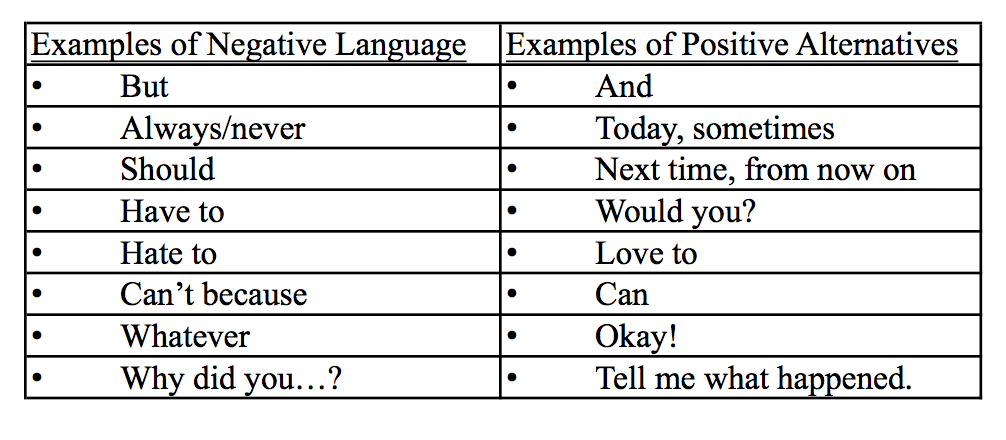By Carolee Colter & Mark Mulcahy
Intentions matter but so does your choice of words. Certain words can trigger a negative reaction in the mind of the receiver while other words can open up hearts and minds.
In general, negative language is demanding and blaming, and emphasizes what can’t be done. Positive language on the other hand focuses on the future, offers choices and emphasizes what can be done.

Consider the contrast between “but” and “and” when connecting two clauses—and two ideas. “But” cancels whatever has gone before. For example, “You are doing a really good job but you need to pick up the pace in responding to customer questions.” The listener will not take in the fact that they are doing a really good job. What they will hear is that they are not answering customer questions fast enough. So either completely de-couple these two thoughts and discuss them in two separate conversations, or consider using “and”.
“And” connects instead of canceling. It demonstrates that two or more facts can be true at the same time. A person can be a really strong performer and still have an area to work on. The customer experience in your store can be mostly very welcoming, and still the person at the service desk appeared distracted at the time a customer approached with a question.
Can you hear the difference in this example? “You are doing a really good job responding to customer questions and you could be even more responsive if you limit the number of projects you are working on while working the customer service counter.” The listener’s good work is acknowledged and they can be empowered to do even better.
How about “always” and “never”? Both remove any possibility of anything else being true. “You never use the ordering pars I’ve set up and so the order is always wrong.” As you can see, the conversation is over. In any case, rarely are “Always” and “Never” completely true.
Using “sometimes” allows more opportunity for the speaker to state simply what has been observed and for the listener to be in the conversation and learn from the situation. “Sometimes I’ve noticed that our inventory levels are higher when the order is left till the end of the day. The ordering pars may not be followed as closely as when the order is given more time.” Now there can be an open discussion of what is really at the heart of the matter from both parties.
Now let’s look at starting questions with “Why did you….?” This is how you start an interrogation. There is an unspoken assumption that the person being questioned did something that they must now justify. The questioner is, maybe unintentionally, taking on the position of judge. The receiver is going to feel defensive right out of the gate.
Contrast this with “Tell me what happened.” It is not assuming right or wrong but simply asking for information.
Of course body language and tone of voice will have a role in how the receiver interprets the request. That is true of all these words. Yet the words themselves have power that needs to be understood so that they are used with care.
Consider bringing this list to your next team meeting and seeing where these words land with each of your staff. It could make a difference in how the team communicates moving forward.
Carolee Colter has been consulting for co-ops and independents in the natural foods industry for over 30 years. She’s been leading workshops at Provender for most of those years. As the leader of the HR Team of CDS Consulting Co-op, she conducts employee surveys, supports co-op boards in hiring and compensating their general managers, and helps employers with job descriptions, pay scales and personnel policies. With Mark Mulcahy and Allen Seidner, for the past 18 years she’s co-led Rising Stars leadership seminars specifically for the natural industry.
Mark Mulcahy is an award winning retail consultant, educator, and organic advocate. He is the owner of Organic Options, which provides consulting for co-ops and independent retailers worldwide. With more than 36 years in the organic produce industry, Mark is well known for his creative merchandising, effective training techniques, passion for produce, successful financial strategies and dedication to sustainable agriculture.
Mark is the co-creator and presenter of Rising Stars, a leadership development course for natural food retailers and Roots & Relationships, a fun, thought-provoking, interactive and inspiring journey into the unique legacy of food and its relationship and connection with our mind, body and community.
Have more questions?
Get in touch with one of our consultants.

